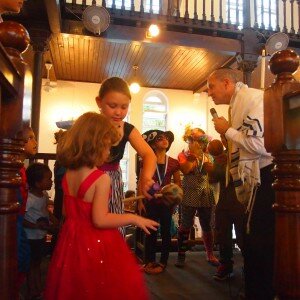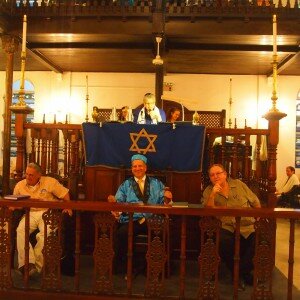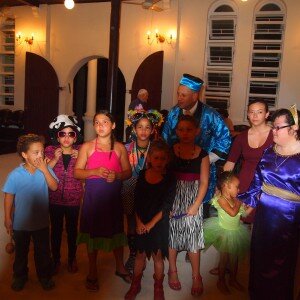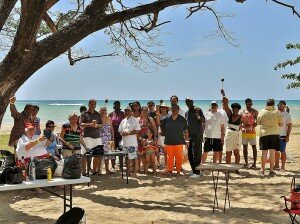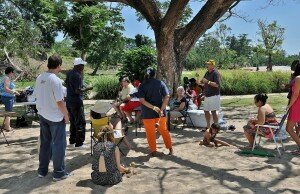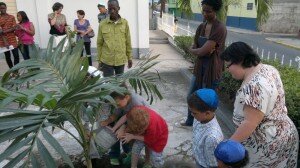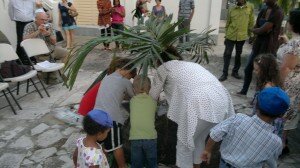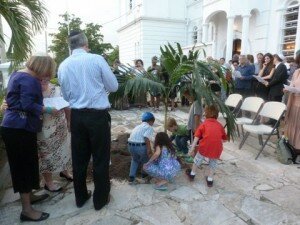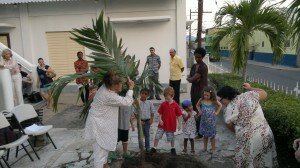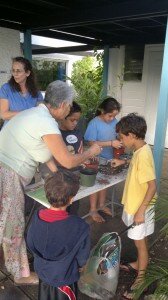Chanukah is here! Special newslette...
...
Newsletter – September 2013
SEPT. 2013 UCI Newsletter...
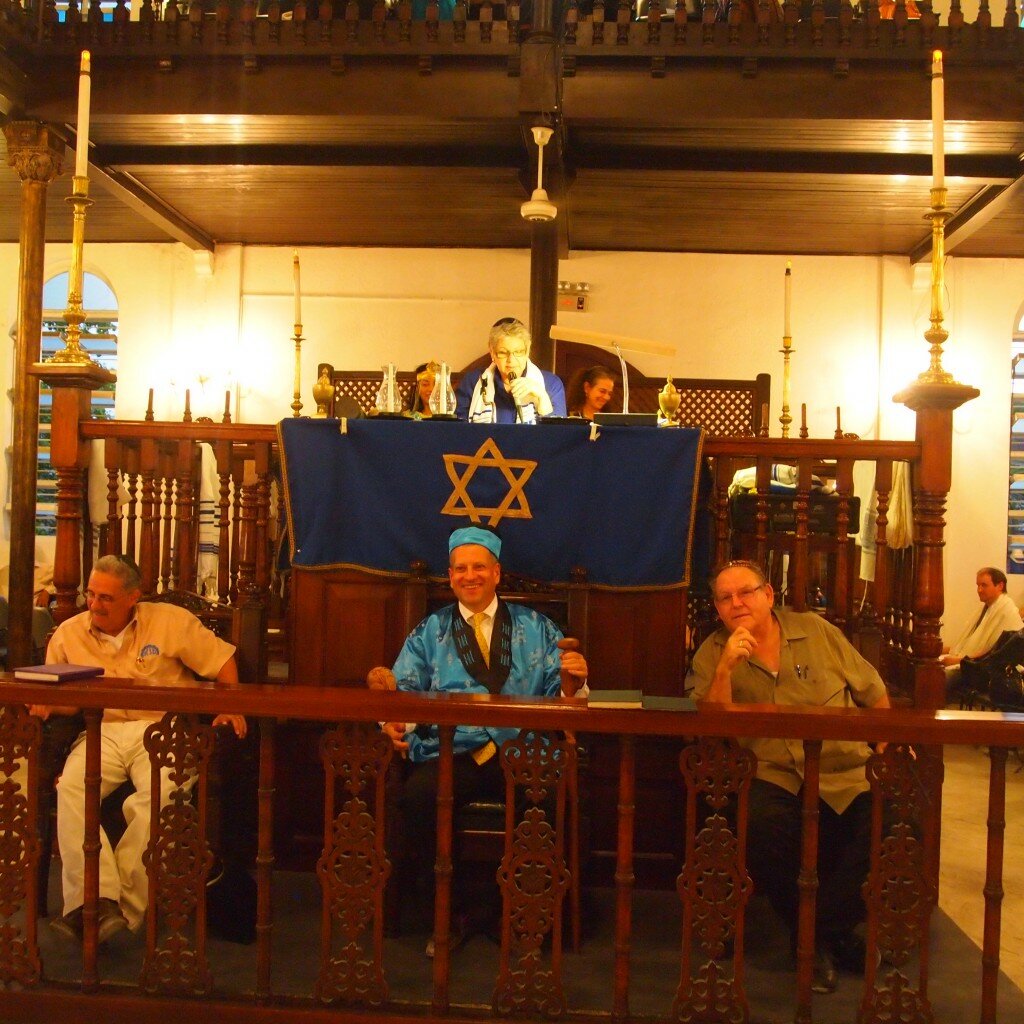
Purim at the Synagogue!
Our Megillah reading and costume wearing at the synagogue....
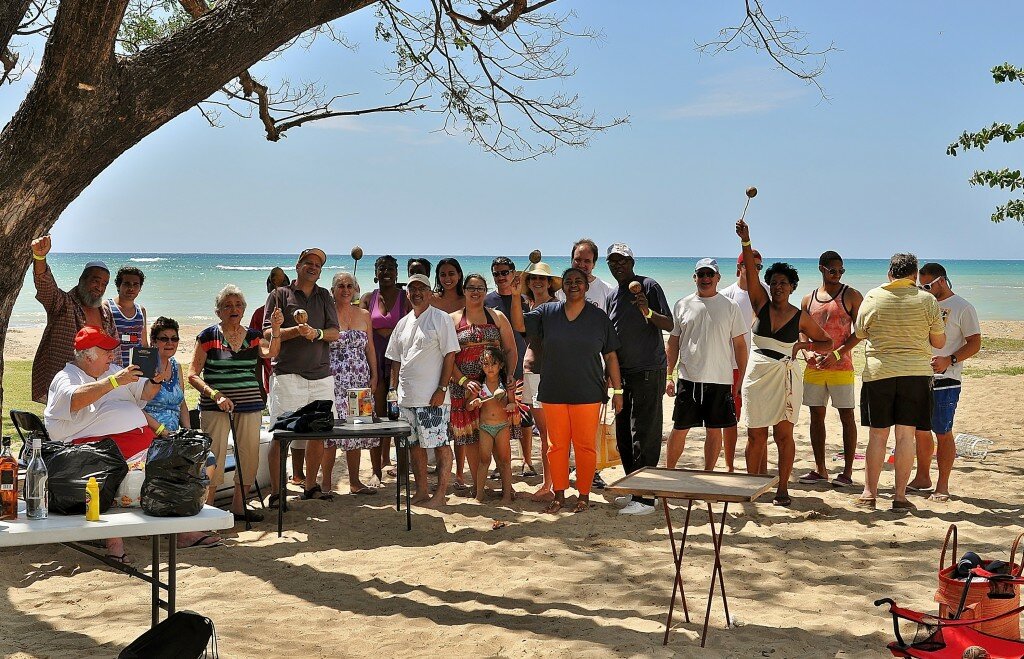
Purim at the Beach!
Swimmers Beach, Morant Bay. ...
-
Chanukah is here! Special...
-
Newsletter – Septem...
-
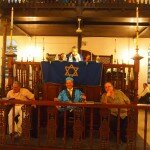
Purim at the Synagogue!
-
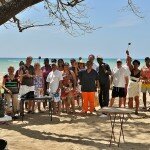
Purim at the Beach!
-
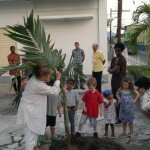
Tu Be’Shvat Tree Pl...
-

Tu Be’Shvat at Star...
-
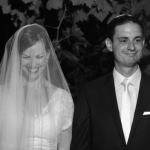
Newsletter – Januar...
-
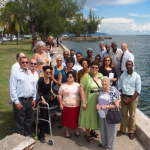
Jamaican Jewish Life Toda...
-
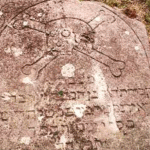
Oy-yuy-yuy & a bottl...
-

Becoming Jamaica’s Rabbi:...
Chanukah is here! Special newsletter
Newsletter – September 2013
SEPT. 2013 UCI Newsletter
Newsletter – January 2013
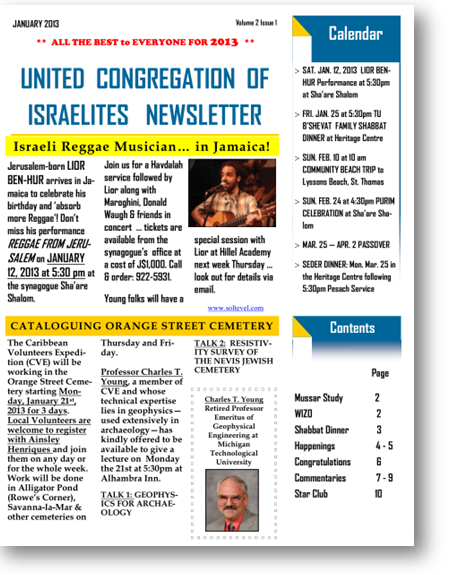
UCI Newsletter Jan 2013
Oy-yuy-yuy & a bottle of Schnaps
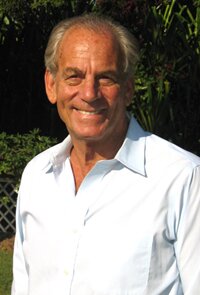
By Ed Kritzler
My editor was firm: Pirates of the Caribbean movies made a billion “so we’ll call your book Jewish Pirates of the Caribbean.” I agreed: “Yes, a great title, but truth be told, most of my Jewish pirates were nowhere near the Caribbean.”
The Meditteranean was plundered by both the Pirate Rabbi of Holland Samuel Palache, and Sinan the Jew, Barbarossa’s 2nd in command; Chile was Suboltol Deul base, and Moses Cohen Henriques’ pirate island was off the coast of Brazil.
“But o.k. if we have to go with that title, there were a couple of Jewish pirates in the Caribbean.” I told him about Jamaica’s Bartholomew the Portuguese, a successful failure, famous not for his successes but for his escapes, and the pirate Jean Lafitte known to Americans as the hero of the battle of New Orleans who wrote “my Jewish-Spanish grandmother, a witness at the time of the Inquisition, inspired in me a hatred of the Spanish crown” And it was off Cuba that in 1628 Moses Cohen Henriques captured the Spanish Silver fleet, a billion dollar haul in today’s currency.
So, I told him I’m fine with Jewish Pirates of the Caribbean. But can he give it a broader subtitle like Sephardic Pioneers or Underground in the New World? “No,” he said. But for you my UJCL readers, you are mishpoche and therefore I have to tell you the full story.
The major role of Jews and pirates was we were like the brains behind their brawn, i.e. We advised and backed them.
From the Age of Discovery, secret Jews sailed with the explorers, marched with the conquistadors and were among the first settlers in every New World colony. This early history is largely unknown because few knew these pioneers were Jewish. Forbidden entry because of their religion, Iberian Jews posed as New Christians from Portugal, the one settler group that did not require proof of Catholic ancestry.
A mercantile people, Jews in the New World went about their business
(as merchants, traders and ship owners) of becoming the first merchant class in the Spanish Empire. As long as they pretended to be Christian and delivered the goods, no one questioned too closely their religiosity. For most of the l6th century, the parties were content with the trade-off: The king needed the Jews to insure his cash flow, and they needed him to keep the Inquisition at bay.
Each colony had an underground community of Jews known only to each other and brethren in other colonies. Together they dominated commerce.
In the 16th century, when the known world doubled in size and international trade became big business, conversos established a trade network that spanned the globe. In concert with Jews scattered world-wide by the Sephardic Diaspora, they formed a global tribe of inside traders, a world wide intelligence network bonded by heritage, language and a hatred for Spain.
Once their trade network was established, however, Jews became expendable. In the l6th and l7th centuries, thousands of New World conversos were arrested, tortured and tried. Found guilty, their wealth was confiscated, and they were first flogged, then either imprisoned, strangled, burned to ash, condemned to work in the salt mines of Venezuela, or row galley ships across the Pacific from which none returned.
Jamaica Haven
“They are good and useful spies,” said Oliver Cromwell of the Jews who when the Inquisition threatened, advised him in the conquest of Jamaica. Welcomed by the English, Jews from all over the New World shed their converso cloaks and moved to Jamaica. The community soon included ship owners from Mexico and Brazil, traders from Peru and Columbia, and ship captains and pilots from Nevis and Barbados. Together their knowledge of New World trade was unsurpassed. By 1660, Jamaica had become the Jews’ principal haven in the New World. Situated in the middle of the shipping lanes, Jamaica was an ideal base from which to strike at Spanish shipping, and engage in contraband trade with the Main. Jamaica’s Jews were major players in both activities.
Having convinced the island’s new leaders that the best way to defend the colony and have it prosper was to invite the pirates of the Caribbean to move there, Port Royal became the home base of the feared Buccaneers of the West Indies and piracy the island’s chief industry. Jewish merchants, in coded correspondence with converso merchants in the Spanish colonies, were able to ascertain what ship was sailing when, its cargo, route, destination, and what its captain may have secreted in his cabin. Thus informed, they financed and advised the buccaneers, and got first dibs on the booty.
Port Royal’s English merchants, new to the New World, could not compete with those they called “descendants of the Crucifers of our Lord,” and repeatedly petitioned for their expulsion. One complained:
“The infinite number of Jews who daily resort to this island have made Port Royal their Goshen and will do nothing but trade…This is a great and growing evil and had we not warning from other Colonies we should see our streets filled and the ships hither crowded with them. This means taking our children’s bread and giving it to the Jews. We did not want them at Port Royal, a place populous and strong without them.
Another by 72 “Christian merchants” accused the Jews of practicing what is today normal business practice:
“The great Mischief we suffer by them is that their trading is a perfect monopoly, for they are a kind of joint stock company, and not only buy the choicest and best goods, but frequently buy up whole cargoes, and undersell petitioners, which they can better bear by their penurious way of living…”
Prejudice could not stand up to economics. Jews’ contribution to Jamaica and England’s prosperity determined the Crown’s position in their favor. In two decades (1656-1676), in large part due to the role of these proven entrepreneurs of wealth in the silent trade (illegal trade with Spanish colonies) and their dealings with the buccaneers, Jamaica funneled to England an estimated four million pounds of silver. England’s Committee of Accounts noted the island had become “the base for the greatest flow of silver and gold [and] more bullion is yearly imported from thence than from
all other of the King’s dominions laid together.”
Port Royal, with its wealthy Jewish merchants, ship owners and synagogue, was known as the “Treasure House of the Indies”. In the ascendancy of the Buccaneer Admiral Henry Morgan, the Jews found their “Joshua.” His six raids on Spanish ports, financed by the merchants, and culminating in the burning of the “Golden City of Panama,” brought the Spanish Empire to its knees. In the Treaty of Madrid in l670, Spain acceded to Europe’s right to settle the New World…and Jews were finally free to be Jews.
The Great Earthquake of 1692 brought a climatic end to the pirate port when the sea swallowed two-thirds of Port Royal. From an infamous pirate capital, Jamaica, by 1698, had become a sugar island worked by 40,000 slaves, and after 1713, “the centre for slave distribution in the Caribbean and North America.” It was then that England’s Royal African Company was awarded by the asiento – the monopoly right Spain granted to conduct the slave trade with Spanish America. A few Jamaican Jews did participate in the trade, but most dealt in dry goods. This fact was noted in a London petition in 1735 that protested the on-going effort of rival merchants to exclude Jews. Their defenders (92 Jewish and non-Jewish merchants) wrote: “The Jews [in London] are almost the only persons that send any dry, fine goods to Jamaica, at their own risk, and on their own account…for the supply of the inhabitants of the island, and for making proper sortments of goods for the Spaniards…”
As Jewish involvement with piracy petered out in the Caribbean, the rovers and their Sephardi sponsors disbanded, only to reunite when in the following century a budding new nation would enlist them in its fight for liberty. In the American Revolution, a dozen prominent Jews sided with the rebels as privateers. Celebrated as founders of early Jewish congregations, it is not commonly known that these men owned and operated more than a few of the pirate ships that captured or destroyed over 600 British ships and took cargoes and prizes with an estimated value of $18 million.
Editor’s note: If you want to know more, Google “Ed Krtizler” and read his book. Jewish Pirates of the Caribbean, published by Doubleday
Becoming Jamaica’s Rabbi: Looking Back and Moving Forward
Rabbi Dana Kaplan – Shaare Shalom Synagogue in Kingston, Jamaica
Originally posted on THE BLOG 04/20/2012
 Making any transition is difficult. But moving to a new country to become the only rabbi for an entire island is a huge leap. If that wasn’t enough, when I passed through immigration and customs at Norman Manley International Airport in Kingston, Jamaica on Aug. 31, 2011, I became the first ordained rabbi to lead the Jamaican Jewish community in 33 years.
Making any transition is difficult. But moving to a new country to become the only rabbi for an entire island is a huge leap. If that wasn’t enough, when I passed through immigration and customs at Norman Manley International Airport in Kingston, Jamaica on Aug. 31, 2011, I became the first ordained rabbi to lead the Jamaican Jewish community in 33 years.
When I used to take vocational or personality standardized tests, they always indicated that I was adventurous, willing to take risks. After 10 years of faithfully ministering to my flock in Albany, Ga., trying to maintain a vibrant Jewish religious life in a small and declining southern city, I was offered a new contract and given 30 days to consider it. I started thinking that it might be time to explore other options.
I looked at the Central Conference of American Rabbis’ list of congregations in need of rabbinic leadership and one entry under the World Union for Progressive Judaism caught my eye: Kingston, Jamaica. I had researched Caribbean Jewish history and so I knew that Jamaica had a distinguished heritage and produced many accomplished Jewish authors, painters and even rabbis. I also learned that the national motto was “Out of Many, One People,” a concept I found quite appealing.
Eight years earlier, I had written an article for Cuban Studies, an academic journal that deals with the emigration of Cuban Jews in the early 1960s. One of the primary routes taken by this group was from Havana to Miami by way of Kingston. While writing my article, I corresponded via e-mail with Ainsley Henriques, one of the leaders of the Jamaican Jewish community. Ainsley had been enormously helpful, providing me with significant details and referring me to additional sources.
Sure enough, several years later, Ainsley was once again the contact person for the rabbinic position in Kingston. I hastened to write to him and we began an extended correspondence via e-mail, phone and then group conferencing on Skype. The community was indeed looking for a rabbi and they needed someone who was willing to take on a position that had been vacant for more than three decades in a city that was desperate for a renaissance.
The history of the Jews in Jamaica is fascinating, stretching back hundreds of years. Allow me to give you a taste.
The first Jews came to the island with the Spanish in 1494. Of course, they were not practicing Jews since the entire Jewish community of Spain had been given the choice of converting to Catholicism or going into exile — a double exile — just two years earlier. During that period, large masses of Jews “converted” to Christianity in order to escape expulsion and persecution. They became Conversos, also derogatorily called Marranos, practicing their Judaism in secret. Some of these Conversos managed to leave Portugal for Jamaica, hoping to escape from the constant pressure of the inquisitors. We know relatively little of their inner lives. Presumably many, but certainly not all, tried to practice their faith privately, very discreetly.
Many of the Spanish Jews traveled by land across the Iberian peninsula into Portugal where they were offered freedom of religion. But that freedom was revoked just five years later. The Portuguese king made plans to forcibly convert many Portuguese Jews, particularly younger ones, while expelling the others. Once he realized that many Portuguese Jews would still leave, he changed course and forcibly converted every single Jew in the country. Fortunately, the inquisition was not introduced into the country in the beginning, giving the Conversos time to adapt to a pressurized and schizophrenic existence.
Although prohibited from emigrating, many still found ways to leave the country, moving to Portuguese Jewish communities in Hamburg, London, Livorno and especially Amsterdam. Over the next 150 years, some of these former Conversos came from Amsterdam to the Caribbean. Many of them settled in Port Royal and later Spanish Town and 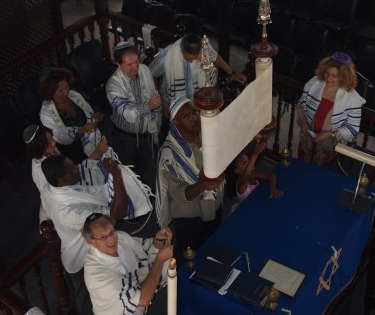 Kingston as well numerous smaller towns throughout the island, including Falmouth, Montego Bay and Alligator Pond.
Kingston as well numerous smaller towns throughout the island, including Falmouth, Montego Bay and Alligator Pond.
Another wave of Jewish immigrants came to Jamaica after the 1655 British colonization of Jamaica. Although archaeologists have not positively identified its remains, a small synagogue was apparently constructed in Port Royal, a hustling and bustling commercial center known for pirates and crime. Much of the city literally sank into the ocean after a massive earthquake in 1692. The bulk of the Jewish community shifted to Spanish Town and then, after it became the capital in 1872, to Kingston. The separate Sephardic and Ashkenazi congregations merged in 1921 to form the United Congregation of Israelites.
During the late 1960s and early 1970s, the community was ably led by Rabbi Bernard Hooker, who went on to become the head of the Liberal movement in Great Britain. Rabbi Hooker became the first major radio talk show host in Jamaican history, giving Jamaicans of all backgrounds advice on everything from whom to date to how to die. This was at a time before the Internet when there was still only one TV station and a handful of radio stations, so virtually the entire country tuned in to hear the rabbi give his weekly spiel. (Just about every time I meet someone, their first response to hearing that I am a rabbi is to say, “I used to always listen to Rabbi Hooker on the radio.”)
In the mid-1970s, the political environment changed, and many middle-class Jamaicans began to emigrate. Rabbi Hooker returned to England and, after two failed attempts to bring in a new rabbi, longtime community leader and professional photographer, Ernest de Souza, became acting spiritual leader. Ernest did everything from performing the synagogue rituals to organizing the office and documenting virtually every activity with photographs. He also served an amazing array of communal institutions, including the Board of Governors of Hillel Academy, the Jewish sponsored private school that had been established in the time of Rabbi Hooker. Tragically, he suffered a massive heart attack after Shabbat morning services in March 2000 and passed away at the age of 66.
After his sudden death, Stephen Henriques stepped in, helping to keep the community together for the next 11 years while holding a full-time job selling heavy farm equipment. Stephen’s compassionate nature allowed him to empathize with the many different types of people who identified as Jewish in a community that had become highly assimilated and predominately intermarried. Along with Michael Matalon and several other volunteers, Stephen conducted services on both Fridays and Saturdays and met with those interested in converting to Judaism.
And now it’s my turn.
Being the only rabbi in the country has been a fascinating experience thus far. Many people call or e-mail me with all types of inquiries relating to Jews and Judaism since I am now seen as the authority on all such matters. Some have questions relating to the Jewish origins of Christianity while others want to investigate their own Jewish roots; there are tens of thousands such individuals in Jamaica.
While I believe that there is much to do here, many people have become accustomed to the way things have been done for so long. On a number of occasions, I made changes in complete innocence which elicited frightful responses. Nevertheless, there is a consensus that we as a community need to change with the times but in a gradual, thoughtful manner. We want to treasure our Spanish Portuguese Jamaican heritage, deepening our attachment to it while exciting and engaging a new generation.
Our religious programming has been well received. We had an exciting series of Purim celebrations, including a retelling of the story of the Megillah which brought out 64 adults and 33 children, and our Passover service brought out well over a hundred people, some of whom were returning Jamaican Jews visiting family and renewing their connection with their ancestral synagogue.
 Indeed, the excitement is palatable as we move towards a distinctively Jamaican form of Judaism that can enrich the hearts, minds and lives of many people from all sorts of backgrounds and is sure to inspire our Jewish brethren around the world.
Indeed, the excitement is palatable as we move towards a distinctively Jamaican form of Judaism that can enrich the hearts, minds and lives of many people from all sorts of backgrounds and is sure to inspire our Jewish brethren around the world.

